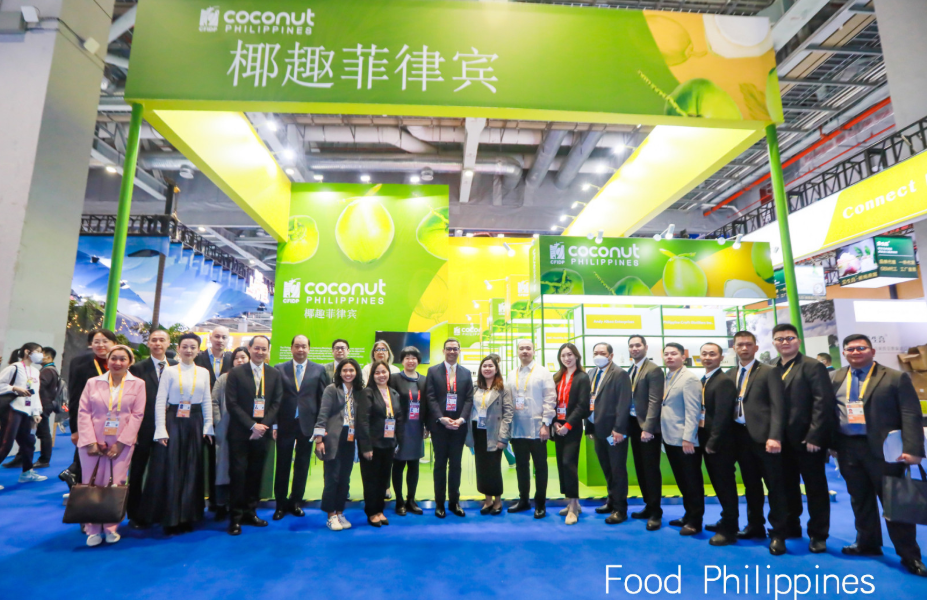
The Coconut Philippines successfully debuted at the 5th China International Import Expo (CIIE) held in Shanghai, China on 5-10 November 2022 with an onsite sales amounting to USD17.8 million. Since its maiden edition in 2018, the CIIE has become the world’s largest import show, serving as an economic link ibetween China and the rest of the world.
Coconut Philippines in CIIE
During his opening remarks, DTI Secretary Fred Pascual announced the first time participation of the Coconut Philippines in the CIIE to offer new and exciting coconut products. Coconut Philippines in CIIE 2022 was presented through the support of the Coconut Farmers and Industry Development Plan (CFIDP) as part of the government’s efforts to strengthen the Philippine coconut industry.
Undersecretary Blesila A. Lantayona, Head of the DTI’s Technical Working Group on Coconut Enterprise Development emphasized that “the Philippine participation in CIIE through CFIDP is one of the government initiatives to improve the coconut industry’s competitiveness and strengthen its role as one of the country’s key economic drivers.”
The hybrid participation of 23 coconut enterprises in CIIE 2022 was led by the DTI Export Marketing Bureau (EMB), in partnership with the Philippine Trade and Investment Centers (PTIC) in China, the Office of the Agriculture Counsellor in China and the Center for International Expositions and Missions (CITEM).
The Coconut Philippines pavilion provided visitors with unique and premium coconut food products such as coconut oil, coconut water, coconut milk, coconut cream, coconut liquor, coconut chips and artisanal coffee. The Coconut Philippines also showcased non-food coconut products such as coconut fiber-based products for handicrafts, horticulture, and bio-engineering, which solidifies the Philippines’ position as a reliable source of high-quality and innovative coconut products.
CIIE also served as a venue for the formation of strategic cooperation between the Philippines and China. The EMB, through PTIC-Shanghai, received a Letter of Intent (LOI) of Cooperation from various Chinese companies to enter into a long-term partnership with the Philippine local coconut manufacturers for OEM manufacturing and to import coconut as raw materials for their branded products.
DTI’s Officer-in-Charge for Trade Promotion, Assistant Secretary Glenn G. Peñaranda said “this cooperation will further open opportunities and expand the presence of our coconut products in the growing Chinese market.” Further, he added that “this strategic cooperation will serve as a catalyst for further development and growth of Philippine coconut producers and farmers that will redound to higher income and more jobs.”
The following are coconut and coffee enterprises that represented the Coconut Philippines in CIIE 2022: Ahya Coco Organic Food Manufacturing Corporation, Amazing Foods Corporation, Andy Albao Corporation, B&C Healthy Snack Foods Inc., Cocoplus Aquarian Development Corporation, Dory’s Distillery Inc., Federation of Peoples’ Sustainable Development Cooperative, Fruits of Life, Inc, Greenlife Coconut Products Philippines Inc., Limketkai Manufacturing Corporation, Philippine Craft Distillers Inc., Tongsan Industrial Development Corporation, Treelife Coco Sugar, Wellnesscare International Corporation, Café Amadeo Development Cooperative, Project Beans Trading, VerraCoffee Inc., Agrisolutions Marketing Cooperative, BF Industries, Inc., Coco Technologies Corporation, Lolo Bobby Handicraft, Quezon Federation and Union of Cooperatives and Tupi Supreme Activated Carbon, Inc.
The Philippine Coconut Export Industry
For many years now, the Philippines has been known for its production of high-quality coconut products. The country is one of the top suppliers of coconut products in the world.
Coconut products are an important part of the Philippine economy and provide employment for millions of people in the country. About 25 million Filipinos are directly or indirectly dependent on the coconut industry.
Coconut is a versatile raw material that can produce high-value food and non-food products. Thus, increasing productivity and income of coconut farmers and improving access to education, thereby alleviating poverty and achieving social equity.
The Philippines has evolved into a remarkable example of what a single drupe can accomplish for a nation’s welfare and development through time, thanks to the development of many “coconut technologies” like Coco-biodiesel, coconet or COCOPEAT. END.
Date Published: 29 November 2022


